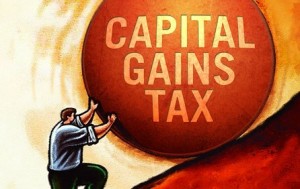One of the principles of good tax policy and fundamental tax reform is that there should be no double taxation of income that is saved and invested. Such a policy promotes current consumption at the expense of future consumption, which is simply an econo-geek way of saying that it penalizes capital formation.
 This isn’t very prudent or wise since every economic theory agrees that capital formation is key to long-run growth and higher living standards. Even Marxist and socialist theory is based on this notion (they want government to be in charge of investing, so they want to do the right thing in a very wrong way – think Solyndra on steroids).
This isn’t very prudent or wise since every economic theory agrees that capital formation is key to long-run growth and higher living standards. Even Marxist and socialist theory is based on this notion (they want government to be in charge of investing, so they want to do the right thing in a very wrong way – think Solyndra on steroids).
To help explain this issue, the Wall Street Journal published a very good primer on taxing capital gains.
The editors begin with an uncontroversial proposition.
The current Democratic obsession with raising the capital gains tax comes from a mistaken belief that the preferential rate applied to the sale of a family business, farm or financial asset is a “loophole” that mainly benefits the rich.
They offer three reasons why this view is wrong, starting with a basic inequity in the tax code.
Far from being a loophole, the low tax rate applied to capital gains is beneficial and fair for several reasons. First, under current tax rules, all gains from investments are fully taxed, but all losses are not fully deductible. This asymmetry is a disincentive to take risks. A lower tax rate helps to compensate for not being able to write-off capital losses.
Next, the editors highlight the unfairness of not letting investors take inflation into account when calculating capital gains. As explained in this video, this can lead to tax rates of more than 100 percent on real gains.
Second, capital gains aren’t adjusted for inflation, so the gains from a dollar invested in an enterprise over a long period of time are partly real and partly inflationary. It’s therefore possible for investors to pay a tax on “gains” that are illusory, which is another reason for the lower tax rate.
This may not seem like an important issue today, but just wait ’til Bernanke gets to QE24 and assets are rising in value solely because of inflation.
The final – and strongest argument – is that any capital gains tax is illegitimate because it is double taxation. I think this flowchart is very helpful for those who want to understand the issue, but the WSJ’s explanation is very good as well.
Third, since the U.S. also taxes businesses on profits when they are earned, the tax on the sale of a stock or a business is a double tax on the income of that business. When you buy a stock, its valuation is the discounted present value of the earnings. The main reason to tax capital investment at low rates is to encourage saving and investment. If someone buys a car or a yacht or a vacation, they don’t pay extra federal income tax. But if they save those dollars and invest them in the family business or in stock, wham, they are smacked with another round of tax.
There’s also good research to back up this theory – some produced by prominent leftists.
Many economists believe that the economically optimal tax on capital gains is zero. Mr. Obama’s first chief economic adviser, Larry Summers, wrote in the American Economic Review in 1981 that the elimination of capital income taxation “would have very substantial economic effects” and “might raise steady-state output by as much as 18 percent, and consumption by 16 percent.”
Summers is talking about more than just the capital gains tax, so his estimate is best viewed as the type of growth that might be possible with a flat tax that eliminated all double taxation.
Nobel laureate Robert Lucas also thinks that such a reform would have large beneficial effects.
Almost all economists agree—or at least used to agree—that keeping taxes low on investment is critical to economic growth, rising wages and job creation. A study by Nobel laureate Robert Lucas estimates that if the U.S. eliminated its capital gains and dividend taxes (which Mr. Obama also wants to increase), the capital stock of American plant and equipment would be twice as large. Over time this would grow the economy by trillions of dollars.
So why aren’t these reforms happening, either the medium-sized goal of getting rid of the capital gains tax, or the larger goal of junking the corrupt internal revenue code for a simple and fair flat tax?
A big obstacle is that too many politicians believe in class-warfare tax policy, even though lower-income people are among the biggest victims when the economy is weak.
For more information, here’s my video explaining that the right capital gains tax rate is zero.
P.S. Some of you may be wondering why I didn’t make a Laffer Curve argument for a lower capital gains tax. The main reason is because I have no interest in maximizing revenue for the government. I simply want good policy, which is why the rate should be zero.
